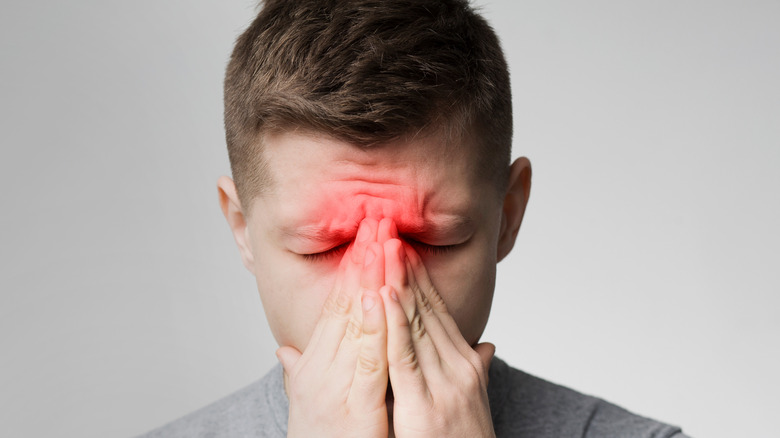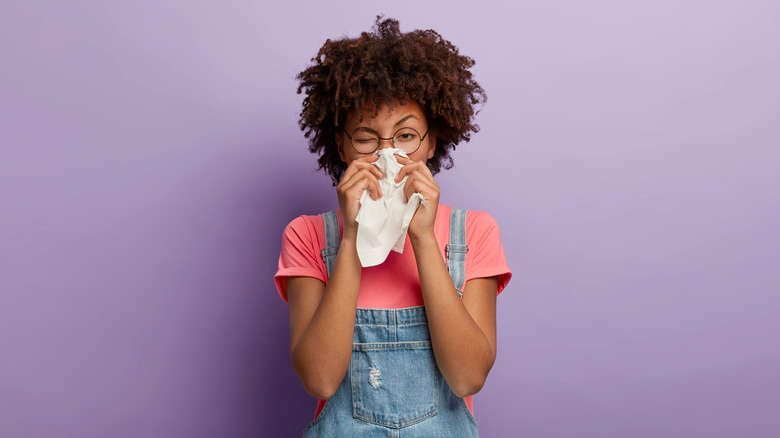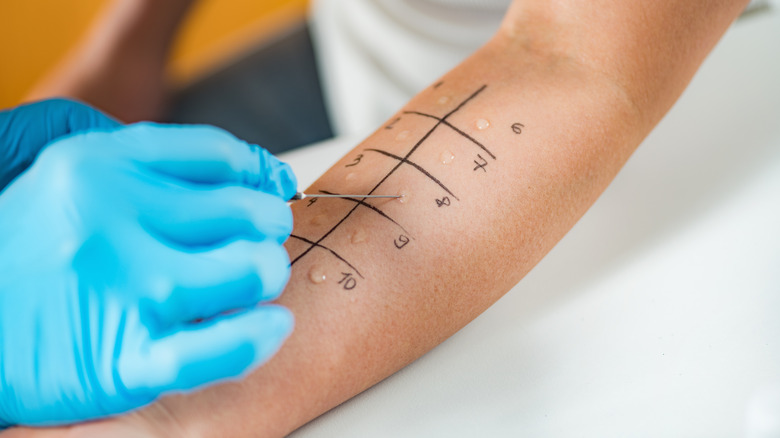Can You Get A Headache From Allergies?
You know it's springtime if you have seasonal allergies — also known as rhinitis or hay fever. Your nose starts to run, you're sneezing, you get this pressure behind your eyes, you get a headache, and your eyes get itchy. You break out the allergy medicine for some relief because allergy symptoms make you feel miserable, affecting your work and school life.
Seasonal allergies are usually caused by pollen, but you may also have an allergic reaction to pet dander, dust mites, or other indoor or outdoor allergens. If you're not sure what you're allergic to, you can see an allergist — a doctor specializing in allergies — who will give you an allergy test to determine what you're allergic to. It's important to know this so you can avoid your triggers.
Allergies can trigger a headache, a sinus headache, or a migraine. You might be wondering which one you have and how to identify it. Knowing which one it is can help you treat the headache to get some relief from the pain. How do you know the difference (via WebMD, the Mayo Clinic, and the American Academy of Allergy, Asthma, and Immunology - AAAI)?
Is it a sinus headache?
Allergies can trigger a migraine, and that is often confused with a sinus headache. Allergies can also trigger a regular headache. So, how do you know which one you have? Let's look at the differences.
A sinus headache is caused by sinusitis, an infection or virus in your sinuses, usually caused by — you guessed it — seasonal allergies. It can also be caused by a cold. Symptoms of a sinus infection are postnasal drip, fever, fatigue, bad breath, coughing, congestion, pressure in the eyes, teeth pain, ear pain, pressure and pain in the nose, eyes, and forehead, and a sinus headache.
The sinus headache will cause pain behind your eyes, nose, cheekbones, and forehead. You might feel it in your ears and teeth as well, and the pain will often worsen when you bend forward or lie down.
Sinusitis is treated with decongestants, antihistamine, and a saline solution for nasal irrigation. You'll need to see your healthcare professional, who will determine if you need antibiotics or not. A sinus infection can go away on its own after about a week but may need antibiotics, especially if it's a bacterial infection (via the Cleveland Clinic and Mayo Clinic).
Is it a migraine?
Allergies can also trigger migraines, and how that happens is...complicated. Experts aren't quite sure why allergies can cause migraines but believe it's a combination of an overreaction from your nervous system and an immune system response to allergens that cause inflammation in your body.
Symptoms of an allergy-induced migraine are pain in your face, particularly in your cheekbones and forehead, nausea, and a stabbing or throbbing pain that is often on one side of your head. You may experience fewer migraines in the winter when allergens are at their lowest and have them more often in the spring, summer, and fall.
Since your allergies are causing the migraines, helping reduce your allergies can help eliminate some of the migraines you're having. There are ways you can avoid your allergy triggers and treat your allergies to reduce your migraines caused by allergies (via WebMD and Aspire Allergy & Sinus).
How to reduce your allergy symptoms
You can start with over-the-counter antihistamines and decongestants to treat the allergy symptoms you're having now. The next step is getting immunotherapy by making an appointment with an allergist. The doctor will do an allergy test to see what you're allergic to and create allergy shots to help your immune system. You'll see a decrease in allergy symptoms, including those painful allergy migraines. Your allergist will give you injections that contain a small amount of your allergens to help your immune system recognize that they are not a threat to your health to build up a tolerance to them instead of overreacting and triggering allergy attacks.
Limit your exposure to your allergens by avoiding going outside on windy days and when the pollen count is high. Use air conditioning with a HEPA filter to keep the air in your home clean and free of allergens. Avoid yard work and hanging clothes outside to dry. Use allergy-friendly covers on your pillows, mattresses, and box springs. Clean with wet mops instead of brooms, and keep pets out of your bedroom. Replace any carpeting with flooring because carpets can keep allergens trapped in them. Use a neti pot daily to clean out your sinuses. You should see a decrease in your allergy symptoms and headaches or migraines after taking these steps (via WebMD, Aspire Allergy & Sinus, and Mayo Clinic).



